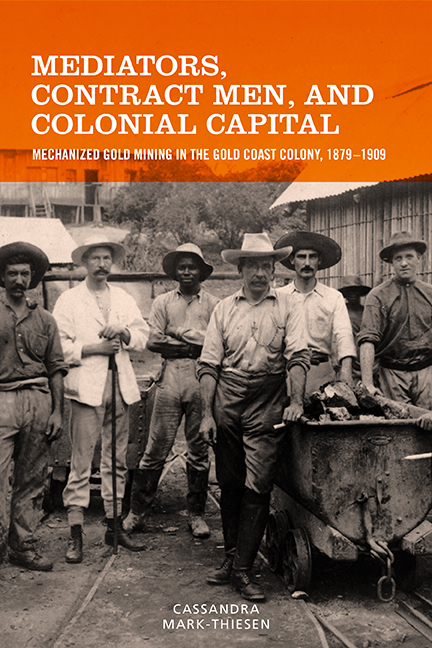 Mediators, Contract Men, and Colonial Capital
Mediators, Contract Men, and Colonial Capital Book contents
- Frontmatter
- Dedication
- Contents
- List of Illustrations
- Acknowledgments
- Introduction
- 1 Prospectors, Politicians, and the Question of “Progress”: The First and Second Gold Booms in Wassa
- 2 Labor Recruitment in the Nineteenth Century: The Place of Practicality
- 3 Disrupted Recruitment at the Turn of the Twentieth Century: Women, Whites, and Other Labor Agents
- 4 Government Strategies for Assisting the Mines
- 5 Labor Agents, Chiefs and Officials, 1905–1909: The Incorporation of the Northern Territories’ Labor Reserve
- Conclusion
- Notes
- Bibliography
- Index
3 - Disrupted Recruitment at the Turn of the Twentieth Century: Women, Whites, and Other Labor Agents
Published online by Cambridge University Press: 29 May 2021
- Frontmatter
- Dedication
- Contents
- List of Illustrations
- Acknowledgments
- Introduction
- 1 Prospectors, Politicians, and the Question of “Progress”: The First and Second Gold Booms in Wassa
- 2 Labor Recruitment in the Nineteenth Century: The Place of Practicality
- 3 Disrupted Recruitment at the Turn of the Twentieth Century: Women, Whites, and Other Labor Agents
- 4 Government Strategies for Assisting the Mines
- 5 Labor Agents, Chiefs and Officials, 1905–1909: The Incorporation of the Northern Territories’ Labor Reserve
- Conclusion
- Notes
- Bibliography
- Index
Summary
The large and flexible supply of Liberians laborers so prevalent in Wassa in the 1870s and 1880s was severely disrupted by the 1890s, when mine managers experienced the rupture of the trusted bonds that they had so carefully built with Liberian labor agents. Instead, new recruitment networks were forged that often entailed fewer checks and balances. The first female labor recruiters appeared on the scene during this period. Even European men now sought to get into this lucrative business. But most of all, African men from other parts of West Africa managed to successfully participate in the recruitment business in growing numbers. The government transport department's recruitment activities for the mines which began around this period will be discussed in detail in the following chapter. This chapter examines the dissolution of the dominance of Liberian labor agents and its aftermath, but especially the opening up of opportunities for new types of labor agents, including some who were ultimately too independent to really be trusted by mine management in the context of what were described as epidemic levels of desertions.
Impacts of Recruitment Bottlenecks in Liberia at the Turn of the Twentieth Century
Two key incidents generated bottlenecks in the recruitment system from Liberia around the turn of the twentieth century. The first was French territorial conquest into southeastern Liberia, starting in the 1890s. The shortage of Kru recruits was immediately felt in the goldmining concessions of the Gold Coast Colony and its surroundings. In 1896, Edwin Cade, the founder of the Ashanti Mining Corporation, reported to his board in London that although Kru men had been greatly sought-after underground workers until this point, it “is regrettable that the supply is running short.” He went on to explain that “the French have put an export duty on them.” French officials had first made claims to Liberian territory in 1885, coincidentally, or not, the year that marked the end of the first gold rush in Wassa.
- Type
- Chapter
- Information
- Mediators, Contract Men, and Colonial CapitalMechanized Gold Mining in the Gold Coast Colony, 1879–1909, pp. 101 - 118Publisher: Boydell & BrewerPrint publication year: 2018


